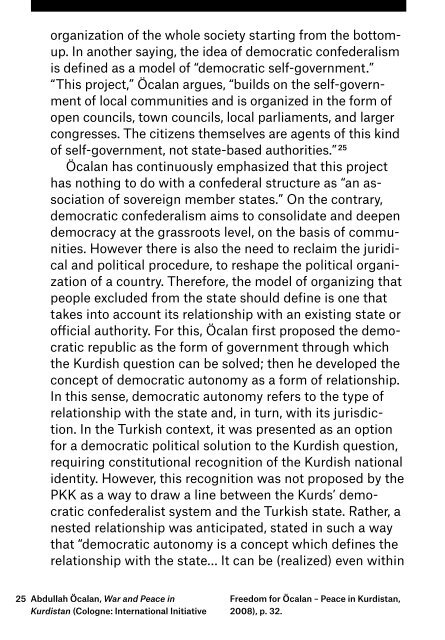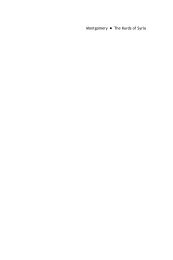Stateless Democracy
1RHiH4Y
1RHiH4Y
Create successful ePaper yourself
Turn your PDF publications into a flip-book with our unique Google optimized e-Paper software.
organization of the whole society starting from the bottomup.<br />
In another saying, the idea of democratic confederalism<br />
is defined as a model of “democratic self-government.”<br />
“This project,” Öcalan argues, “builds on the self-government<br />
of local communities and is organized in the form of<br />
open councils, town councils, local parliaments, and larger<br />
congresses. The citizens themselves are agents of this kind<br />
of self-government, not state-based authorities.” 25<br />
Öcalan has continuously emphasized that this project<br />
has nothing to do with a confederal structure as “an association<br />
of sovereign member states.” On the contrary,<br />
democratic confederalism aims to consolidate and deepen<br />
democracy at the grassroots level, on the basis of communities.<br />
However there is also the need to reclaim the juridical<br />
and political procedure, to reshape the political organization<br />
of a country. Therefore, the model of organizing that<br />
people excluded from the state should define is one that<br />
takes into account its relationship with an existing state or<br />
official authority. For this, Öcalan first proposed the democratic<br />
republic as the form of government through which<br />
the Kurdish question can be solved; then he developed the<br />
concept of democratic autonomy as a form of relationship.<br />
In this sense, democratic autonomy refers to the type of<br />
relationship with the state and, in turn, with its jurisdiction.<br />
In the Turkish context, it was presented as an option<br />
for a democratic political solution to the Kurdish question,<br />
requiring constitutional recognition of the Kurdish national<br />
identity. However, this recognition was not proposed by the<br />
PKK as a way to draw a line between the Kurds’ democratic<br />
confederalist system and the Turkish state. Rather, a<br />
nested relationship was anticipated, stated in such a way<br />
that “democratic autonomy is a concept which defines the<br />
relationship with the state… It can be (realized) even within<br />
25 Abdullah Öcalan, War and Peace in<br />
Kurdistan (Cologne: International Initiative<br />
Freedom for Öcalan – Peace in Kurdistan,<br />
2008), p. 32.<br />
a unitary structure or in a structure of the states.” 26<br />
Yet this nested relationship does not exclude a kind of<br />
“unity” among the Kurds dispersed over different countries<br />
of the Middle East. Since Öcalan proposes to build<br />
self-governing bodies throughout Kurdistan, and wherever<br />
there are Kurds living, democratic confederalism is considered<br />
to be the main mechanism for the unification of Kurdistan<br />
and Kurds. The Kurdish liberation movement, Öcalan<br />
argues, should work for the establishment of such<br />
a system of self-organization.<br />
Consequentially, since 2005, the PKK and all-affiliated<br />
organizations have been restructured on the basis of this<br />
project under the name of Koma Civakên Kurdistan [Association<br />
of Communities in Kurdistan] (KCK), which is<br />
a societal organization presented as an alternative to the<br />
nation-state. The KCK has aimed to organize itself from<br />
the bottom to the top in the form of assemblies: “KCK is a<br />
movement which struggles for establishing its own democracy,<br />
neither ground[ed] on the existing nation-states nor<br />
see[s] them as the obstacle.” 27 The KCK contract’s main<br />
aim is defined as struggling for the expansion of radical democracy<br />
which is based upon peoples’ democratic organizations<br />
and decision-making power. The contract sets forth<br />
a new mechanism of social relations that transcends the<br />
statist mentality. In this sense, democratic confederalism<br />
as the main organizing idea of the KCK is valid everywhere<br />
where the Kurds live, even in Iraq, where Kurds have constitutional<br />
rights, including self-governing their region within<br />
a federal state structure. In this project, there are two determining<br />
factors: 1) the notion of the democracy as people’s<br />
power based on society, not as a form of government, and<br />
2) the exclusion of the state and nation from this notion.<br />
26 Mustafa Karasu, Radikal Demokrasi<br />
(Neuss: Mezopotamya Yayınları, 2009),<br />
p. 260, 275.<br />
27 Kurdistan Workers’ Party (PKK), Partiya<br />
Karkerên Kurdistan PKK Yeniden Inşa<br />
Kongre Belgeleri. Istanbul: Çetin Yayınları,<br />
2005), p. 175.<br />
174–175



